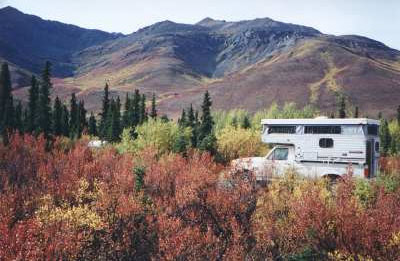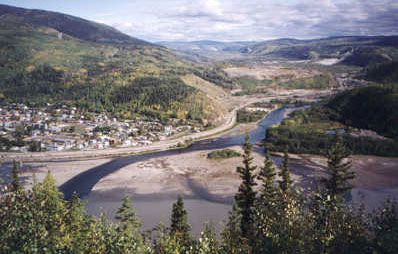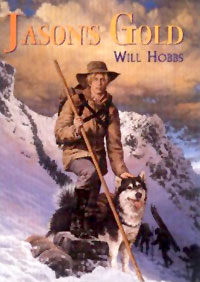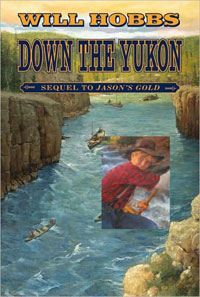 |
Which of the experiences that Jason had have you actually experienced yourself? Jason's feeling for the North comes from my own. In my childhood years in Alaska I was spellbound by the vastness and wildness: the rivers, the glaciers, the mountains, the salmon runs, the moose and the bears. I imprinted on the northern lights and the winter darkness, the gold rush history. A lifetime of backpacking—carrying heavy loads over mountain passes—helped me to describe Jason's struggles on the Chilkoot Pass. My canoeing and rafting experiences, including those in Canada's Yukon and Northwest Territories, came in handy as I described Jason's journey by canoe down the upper Yukon River. My winter camping experiences at twenty below at high altitude in Colorado helped me to write the winter scenes. Why did you choose to dedicate Jason's Gold to your brothers? After dedicating Kokopelli's Flute to my sister, I had been waiting for just the right book to dedicate to my three brothers. Jason's Gold was perfect. We've always been close, and I knew from the outset that making this a “brothers story” would add layers of emotional reality for me. Like me, Jason has two older brothers. At the same time he is adamant about establishing his independence from them, he feels a very powerful connectedness to them. In my story, Jason is trying to catch up with his brothers, who've left Seattle for the Klondike three days before him. As a kid, I remember always hustling to catch up with my brothers, whether it was on the baseball field, in school, or learning to ice skate and ski while we were living up in Alaska. In what way did writing Jason's Gold differ from writing your other novels?
It was very different, because it's an out-and-out historical novel, which was new for me. Ghost Canoe had a historical setting, but it was mostly a mystery. This one involved a mountain of research, some of it conducted even before I knew I was going to write a book about the Klondike. On a 1996 road trip to the far north, we visited Klondike museums in Seattle, Skagway, and Dawson City. You can see our pickup and camper at a campground near Dawson City in the photo on this page. Those amazing fall colors came at the end of August! When you got home, that's when you started reading about the Klondike? For several years, as I was writing other books, I was collecting materials on the Klondike. I had the fever! I timed the actual writing with the 100-year anniversary of the rush. I wrote it during fall and winter of 1997-8. It was a new writing challenge for me. Before, I've made up most of the incidents for my novels “from scratch.” With this story, I wanted the sort of realism that could only be achieved by basing incidents in the novel on actual incidents from the Klondike gold rush. For the same reason the reader will encounter many actual historical figures, like the con man Soapy Smith, and of course, the 21-year-old, not-yet-famous writer, Jack London. What type of experience would you hope readers derive from reading Jason's Gold? As with Far North, I hope they get a good case of virtual frostbite! I hope they are astounded to find out what people very much like themselves did a century ago. A hundred thousand people experienced this great adventure, and forty thousand made it to Dawson City. What those people endured is almost beyond belief. I hope readers come away with the sense that history can be incredibly exciting, and that life in any era is filled with adventure, heroism, courage and love. As you were writing Jason's Gold, were you already thinking Not until I was writing the last few pages. I was so identified with Jason that when Jamie promised she'd return to Dawson City the following summer, I was aching to have that promise fulfilled. I glimpsed that there could be a second book about their adventures together. As the months went by and it was time to “pick a horse” for my next writing project, I wanted to write the sequel immediately! Just stay in the North with Jason and keep going! An especially fun feature would be that I'd be writing the sequel in the summer of 1999, exactly one hundred years after its events it took place. Did you already know what the big events were of 1899? I had come across them in a peripheral way as I was researching Jason's Gold. I knew that the news of a big gold strike at Cape Nome, way out on the Bering Sea, electrified Dawson City that summer. Thousands and thousands of people left town. They floated 1500 miles down the Yukon River and then crossed Norton Sound to reach the new gold mecca of Nome. Now I could jump into the history of the new gold rush as well as researching the course of the Yukon River across Alaska. As you know, I love to write stories that involve a journey, and this would be a marvelous journey for Jason and Jamie to make together. Why doesn't Down the Yukon start right out with Jamie's return and their canoe voyage downriver together? To make a compelling story, I needed context for her return, and for an underlying conflict to heighten the urgency of their journey to Nome. I asked myself, What happened in Jason's life that winter and spring when Jamie was away? This was a good opportunity to bring to life what an extraordinarily colorful place Dawson City really was. As with Jason's Gold, my cast of characters could include some amazing real-life people in their actual historical context. Reading about professional boxing matches and catastrophic gambling binges got me started: one of Jason's older brothers could have gotten in way over his head. I started to picture a bad guy, a promoter.
When Jason and his brothers lose everything, Jason has all the motivation in the world to join the rush to Nome. That's it, and it's at this point that Jamie will return. Almost on the spot, they decide to compete in a race that's been announced from Dawson City to Nome. See my photo on this page of Dawson City, 1996. Note the clear-running Klondike River joining the Yukon river. (That’s Dawson City, 1996, in the photo above.) Did the race really happen that summer? The race is fictional. I loved it as a fictional device. It heightened the conflict with the boxer and the promoter, who are also in the race. Just as I did at the end of Jason's Gold, I have provided an Author's Note at the end of Down the Yukon to explain which events and characters were historical, and which were fictional. Was the mutt, Burnt Paw, always in your story? Always, from the very first line. I suppose that was because, like Jason, I had a void in my heart where King, from the first book, used to be. I realized that Jason wouldn't take to this skinny, starving mongrel right away—far from it. But in the end, this one will be a keeper. Note: For much more detail on the writing of Jason's Gold and Down the Yukon, see the Author's Note at the end of each book. |
|



